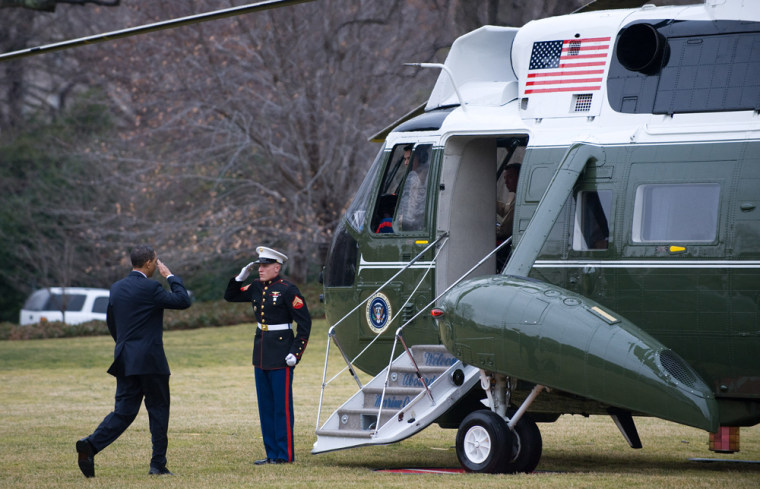President Barack Obama may have no choice but to spend billions of taxpayer dollars to buy a new fleet of White House helicopters, defense analysts say.
The existing 19 helicopters built by United Technologies Corp.'s Sikorsky Aircraft are more than 30 years old, and several have broken down on presidential trips. But most worrisome is that the current fleet does not meet the communication and protection needs of the White House, according to military analysts.
Obama on Monday said the helicopter he has now seems "perfectly adequate," adding that he never had one before and didn't see a need for a more costly aircraft, but "maybe I've been deprived and I didn't know it."
"The president's comments are certainly understandable given the level of White House scrutiny regarding the compensation and travel perks for bank executives and auto manufacturers," said Jim McAleese, a Virginia-based defense analyst.
'Dangerously outdated'
And during an interview Tuesday on CNN's "American Morning," White House spokesman Robert Gibbs reiterated the president's sentiment, saying "we don't need any new helicopters at the White House."
But Loren Thompson, a defense consultant for the Lexington Institute in Virginia, disagrees. The current presidential helicopter is "dangerously outdated," he said.
Thompson's clients include Lockheed Martin Corp., the prime contractor on the new helicopters, though he is not working for the company on the program.
Cost overruns and delays have plagued Lockheed's helicopter program due partly to aggressive plans by the Bush administration to incorporate anti-missile defenses, communications equipment, hardened hulls and other advanced capabilities on the aircraft following the 9/11 terrorist attacks.
Analysts say those efforts — which have inflated the cost of the fleet of 28 new Marine One helicopters — have not been wasted. "You can't lose the president of the United States," McAleese said. "This aircraft only has one purpose and that is to protect the president."
But the new fleet — with a price tag of $11.2 billion that is nearly double the original budget — will cost more than Air Force One.
The Navy — which is in charge of overseeing the helicopter program — told Congress in January that the program's price tag had soared. That notification triggered a formal process mandating the program be re-certified as a national security requirement by senior Pentagon leadership.
Failed to stay within budget
The Navy waited nearly a year before formally disclosing the information to lawmakers as it sought to find ways to keep the program within budget. Those efforts failed.
Part of the review being conducted by the Pentagon will include evaluating every feature of the program and determining what capabilities can be removed to help lower the cost.
Lockheed spokesman Troy Scully reiterated Tuesday that the Bethesda, Maryland-based defense contractor and the Navy are continuing to support the ongoing Pentagon review.
Lockheed's vice president for the presidential helicopter program, Jeff Bantle, said late Tuesday the company has worked diligently with the Navy to find ways to lower costs on the program. He called the Pentagon's review a "healthy process" that would help answer what requirements are essential for the helicopter and at what cost.
Wayne Plucker, a senior aerospace analyst for Frost and Sullivan, said it would be difficult to cancel the entire helicopter program because of the political implications.
But Sen. Carl Levin said the Pentagon "can't just send a boiler plate certification."
"They're going to have to go through the kind of a financial assessment that they do when they start up a weapons system," the chairman of Senate Armed Services Committee told reporters Tuesday.
Purchase to be reviewed
Levin and Sen. John McCain introduced a bill Tuesday to prevent cost overruns and schedule delays in many Pentagon weapons programs.
Defense Department spokesman Bryan Whitman said as an expensive program that has not gone well, the helicopter purchase will definitely be reviewed.
"We are committed to looking at expensive programs and particularly those programs that are underperforming," Whitman told Pentagon reporters Tuesday. "We're going to look at all of our programs ... and certainly (Marine One) is going to be something that's part of that review."
